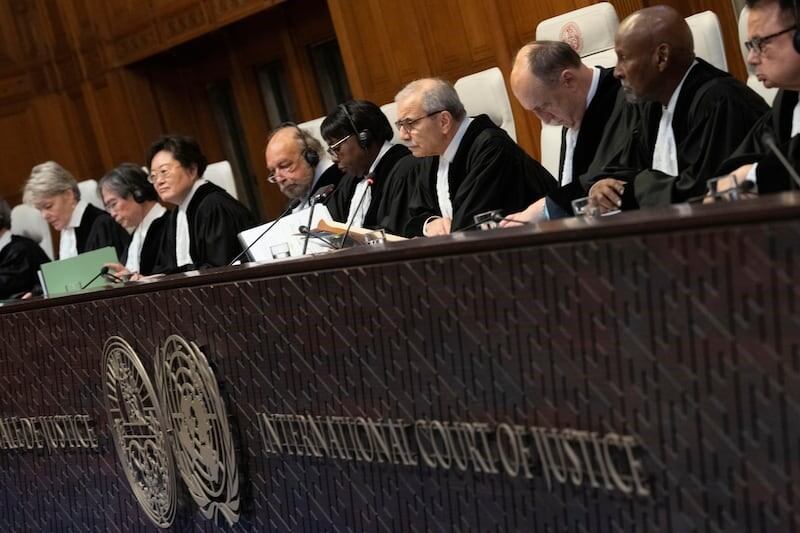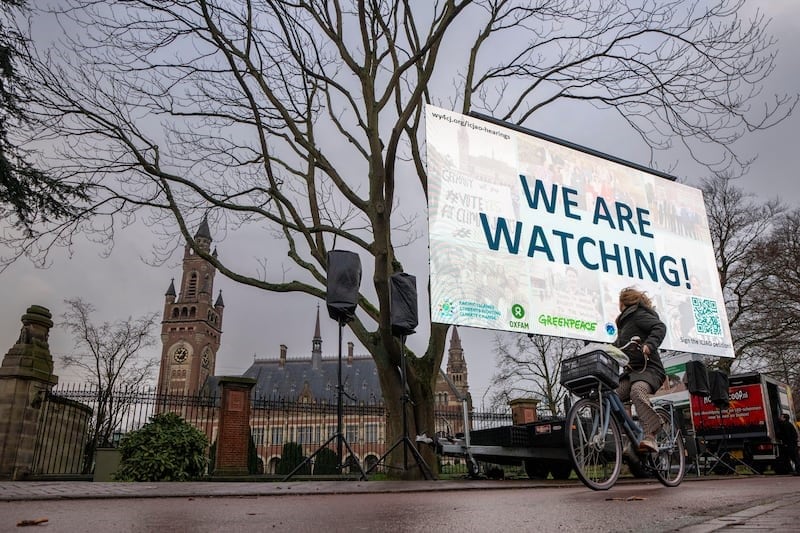Dueling powers the United States, China and Russia are having a rare moment of unanimity on the world stage. But it could be at the expense of the health of the planet.
The top polluters have argued against liability for global warming in landmark hearings on climate change at the International Court of Justice (ICJ).
Two weeks of oral submissions by governments began at the Hague-based court on Monday before 15 judges who are expected to issue a nonbinding advisory opinion next year.
No country has disputed that emissions of carbon dioxide from fossil fuels, agriculture and destruction of forests are the cause of a more than 1-degree Celsius increase in the average global temperature since the mid-19th century and a quarter meter of sea-level rise.
But many of the largest producers of emissions have argued their obligations are fulfilled by participation in treaties designed to address human-driven climate change such as the United Nations Framework Convention on Climate Change, established in 1992, and the 2015 Paris Agreement, which aims to keep the temperature increase to well below 2 degrees Celsius.
They also have asserted that greenhouse gas emissions cannot be likened to transboundary pollution such as contamination of a river that runs through several countries.
The U.S. and China both argued that a direct link between emissions in general and specific events such as a hurricane or flood cannot be proven and nations can't be held liable for losses. Russia, meanwhile, said goals such as limiting the temperature increase and reducing use of fossil fuels are only political aspirations and not legally binding.
“Customary international law is clear that states committing internationally wrongful acts are responsible for injuries caused by those acts, but only when that causation is shown with the requisite directness and certainty,” Margaret Taylor, a legal adviser to the U.S. Department of State, told the court.
“The urgency of the climate crisis is cause for collective action. It is not, however, a basis for dispensing with this fundamental principle of international law,” she said.

The United Nations General Assembly voted last year for the ICJ to hear the case after lobbying from the South Pacific nation of Vanuatu and other island states who fear they will be devastated this century by projected sea level rise and a more volatile climate caused by higher average temperatures.
The court is asked to provide a nonbinding advisory opinion to clarify states’ obligations under international law to prevent global warming and the legal consequences of failing to act.
Vanuatu Attorney Gen. Arnold Loughman has said that pacts such as the Paris Agreement are proving ineffective and island nations hope the court will provide an opinion that spurs greater international action to reduce emissions.
‘Disappointed’
Vanuatu climate envoy Ralph Regenvanu criticized the arguments that existing climate treaties are sufficient, an argument also made by Australia and Saudi Arabia, among others.
“We are obviously disappointed by the statements made by the governments of Australia, the United States, Saudi Arabia and China during the ICJ proceedings,” Regenvanu said in a statement.
“There needs to be an accounting for the failure to curb emissions and the climate change impacts and human rights violation that failure has generated,” he said.
“It is particularly concerning that some of these nations, upon whom we depend for aid and support, have not acknowledged the severity of the crisis or their responsibilities under international law.”

Vanuatu has argued in written submissions for an expansive application of international law to some 20 nations who account for the bulk of greenhouse gas emissions since the industrial era began.
It said a range of international treaties and human rights are violated by allowing carbon emissions to continue and argued for reparations and criminalization of what it calls “ecocide.” However, the examples of specific climate harm it said have already occurred in Vanuatu are unlikely to meet the standard of proof that countries such as the U.S. have said is required.
RELATED STORIES
[ UN climate case could be global circuit breaker: Vanuatu officialOpens in new window ]
Climate scientist Corinne Le Quere testified that since 1851, the U.S. has been responsible for about 0.28 Celsius of warming and China about 0.2 Celsius, based on their emissions. Most of China’s contribution has come since 1990.
The testimony attributed 0.1 Celsius of warming to Russia and nearly 0.2 Celsius to the countries of the European Union. Brazil, Indonesia and India combined contributed about 0.2 Celsius of warming.
Carbon pollution challenged
Ma Xinmin, a legal adviser to China’s foreign ministry, told the court that carbon dioxide was not inherently harmful. Specifically addressing the scope of the United Nations Convention on the Law of the Sea (UNCLOS) he argued that carbon emissions are not pollution of the marine environment.
Carbon dioxide “is essential for life on earth and its ecosystem,” Ma said. “Determining whether the adverse effect of oceans’ absorption of [carbon dioxide] constitutes pollution requires an evidence-based scientific assessment.”
International treaties such as UNCLOS, he said, were not intended to address climate change and can’t be reinterpreted. Doing so would violate the principle of state consent to the original intent of the treaty.
“Unlike conventional environmental pollution, the effect from greenhouse gas emissions are global and historical making it difficult to identify specific sources, establish causation or attribute responsibility,” Ma said. “Accordingly, the legal rules governing environmental pollution do not apply.”
Radio Free Asia (RFA) is an online news service affiliated with BenarNews.
